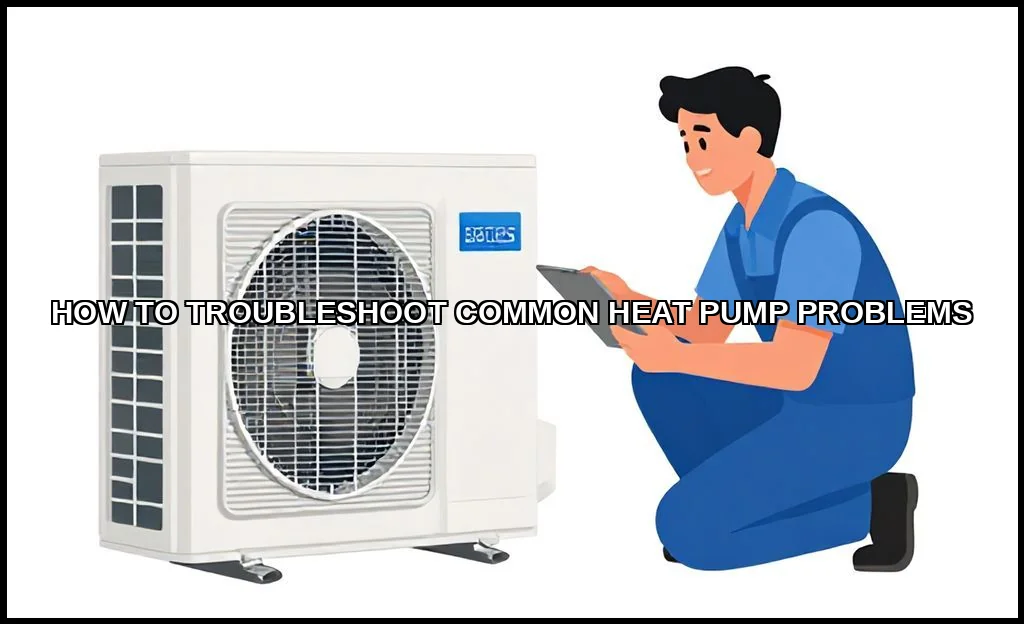A heat pump is the Swiss Army knife of your HVAC system. It heats, it cools, it dehumidifies. But when it falters, your home comfort vanishes fast. Understanding its basic operation is your first step to effective HVAC troubleshooting. The system moves heat rather than generating it, using a refrigerant charge and a key component called the reversing valve to switch between modes. Common failure points often involve airflow, refrigerant levels, electrical components, and that all-important communication with your thermostat.
Before you dive into diagnostics, having the right tools helps. A basic multimeter, a coil cleaning brush, and a reliable thermometer are great starts. For checking airflow temperatures accurately, many professionals recommend using the MEASUREMAN Heater Heavy digital psychrometer. It takes the guesswork out of readings, which is crucial when you suspect your heat pump not heating or cooling properly.

A Step-by-Step Visual Troubleshooting Guide
Start simple. Always check the basics before assuming a major failure. This process can save you a costly service call.
Start with the Obvious: Power & Settings
Is the unit getting power? Check your home’s breaker panel and any outdoor disconnect switch. Verify the thermostat is set to “HEAT” or “COOL” and the temperature setting is correct. A dead thermostat or tripped breaker explains many “failures” instantly. How to reset a heat pump after a power outage is often just flipping the breakers off and on.
Listen and Look: The System Tells a Story
Go outside. Is the outdoor unit running? Listen for unusual noisesgrinding, squealing, or hissing. Look at the coils. Are they excessively dirty or, worse, completely frozen? A heat pump frozen on the outside unit in heating mode often points to a faulty defrost cycle. In cooling mode, it usually means poor airflow. Check your indoor air filter firstit’s the most common culprit.
- Heat pump fan not working outdoors? Could be a capacitor, the fan motor, or a control board issue.
- Heat pump short cycling (turning on/off rapidly)? Often a dirty filter, low refrigerant, or a faulty sensor.
- Heat pump blowing cold air in heat mode? The reversing valve might be stuck, or the system could be in its defrost mode temporarily.
If you’ve checked these and the problem persists, you might need to troubleshoot deeper electrical components. The process shares principles with other heating systems.
Interpreting Common Error Codes and Warning Lights
Modern heat pumps communicate through flashes and codes. A steady or flashing light is your unit’s cry for help. What does a flashing light on my heat pump mean? It varies by manufacturer, but some codes are universal.
| Common Code/Flash Pattern | Likely Meaning | Action Level |
|---|---|---|
| 1 Flash | Loss of Power or Normal Standby | Check power source. |
| 2-3 Flashes | Pressure Switch Fault (High or Low Pressure) | Professional. Could indicate a heat pump refrigerant leak or blockage. |
| 4-5 Flashes | Thermistor (Temperature Sensor) Failure | Professional. DIY if you’re skilled with a multimeter. |
| Continuous Rapid Flash | Compressor Lockout or Fault | Professional repair needed immediately. The heat pump compressor is the heart of the system. |
Always consult your unit’s manual for the specific diagnostic chart. It’s your best guide. Ignoring these codes can turn a simple fix into a compressor replacement.
When to DIY and When to Call a Professional
Honest self-assessment is key. Your safety and your wallet depend on it.
DIY-Friendly Tasks (With Caution)
- Changing air filters monthly. Non-negotiable for heat pump maintenance.
- Clearing debris from around the outdoor unit. Maintain 2 feet of clearance.
- How to clean heat pump coils for better efficiency. Gently use a garden hose (not a pressure washer) on the outdoor coil after brushing.
- Resetting breakers or checking thermostat batteries.
- Ensuring supply vents are open and unblocked.
Call a Licensed HVAC Technician For:
- Any suspected refrigerant charge issue. Handling refrigerant requires certification.
- Electrical work beyond a visual inspection.
- A heat pump compressor that won’t start or is making loud noises.
- Diagnosing a stuck reversing valve.
- All error codes related to pressure or compressor lockout.
Think of it this way: you change your car’s oil, but you don’t rebuild the transmission. The same logic applies. Investing in a good professional for complex jobs prevents cascading failures. Quality workmanship matters across all home systems.
Your Seasonal Maintenance Checklist
Prevention is cheaper than repair. A little attention twice a year keeps your system running smoothly.
Spring (Before Cooling Season)
- Inspect and clean outdoor coil.
- Check refrigerant lines for insulation damage.
- Test system in cooling mode. Listen for irregularities.
- Trim back any new plant growth around the unit.
Fall (Before Heating Season)
- Repeat outdoor coil inspection and cleaning.
- Replace indoor air filter.
- Test system in heating mode. Feel for warm air at vents.
- Listen for the defrost cycle to initiate and complete. It should run for 5-10 minutes max.
- Consider a professional tune-up every 2-3 years for a detailed check of pressures, refrigerant charge, and electrical components.
For a comprehensive, manufacturer-agnostic guide, the EPA’s Energy Star program is an excellent official source for maintenance best practices.
Most heat pump problems follow predictable patterns. Start with the simple, free checks: filter, power, thermostat, and clearances. Understand what the blinking lights are trying to tell you. Know your limitscleaning coils is DIY, handling refrigerant is not. A consistent, simple maintenance routine is the most powerful tool you have. It extends the life of your system, saves money on energy bills, and keeps your home’s climate exactly where you want it. Comfort, after all, is the whole point.
